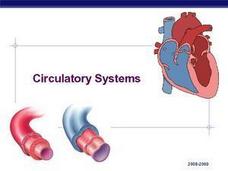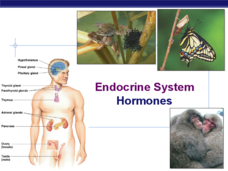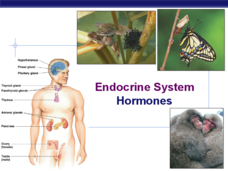Curated OER
Circulatory Systems
A slideshow that covers the all-important details related to basic human circulation. The reasoning for exchange of material methods is presented and then labeled diagrams of the main human transfer systems are shown, along with...
Curated OER
Respiration
For this cellular respiration worksheet, students answer 14 multiple choice questions related to aerobic and anaerobic respiration.
Curated OER
What Do Genes Look Like?
Seventh graders describe the basic structure of the DNA molecule. They identify what an inherited trait is and how it can be determined by one or more genes. Finally, 7th graders identify that plant and animal cells contain several...
Curated OER
A Model of Morphogenesis in Drosophila Melanogaster
Students investigate the following scientific terms and ideas: rates of diffusion, the role of morphogens in the development of larva, the chemical dynamics of a cell, and the significance of embryo polarity during development.
Curated OER
Extraction of DNA from White Onion
Learners conduct lab test with minced onion to determine where chromosonal DNA is located within the cell, and whether or not it can be extracted.
Curated OER
Mountains in the Sea Exploration No Escape
Students study data to hypothesis about the influence of a water circulation cell on the retention of benthic invertebrate larvae in the area of a seamount. They investigate the positives and negatives of larvae retention in this series...
Curated OER
Evolution Explorations
Students compare characteristics of animals and human beings. In this biology instructional activity, students observe an animal and record their observations. They infer whether the evolution theory is true or not.
Curated OER
Poriferans and Cnidarians
Students study the major phyla of the animal kingdom. In this biology lesson unit, students identify their general characteristics. They define taxonomy terminologies.
Curated OER
Adaptations
Eighth graders choose an animal and research its various adaptations using
their information, 8th graders create an informational tri-fold brochure or newsletter. They should include facts about the animal's adaptations as well as...
Curated OER
Shelter/Refuge
Students research shelters and places of refuge for animals and humans. For this shelters lesson, students read paragraphs about animal and human shelters. Students complete an activity about beavers and shelters. Students then complete...
Curated OER
Water and Ice
Students will observe, measure and describe the phase changes of ice. In this science lesson plan, students observe ice as it changes phases. Qualaitative notations made by individual students will be shared and compared.
Curated OER
Kidney Structure and Function: removing intracellular waste
Your class will learn all about the function of the kidney and how it operates in animals from different habitats. The methods of absorption, filtering and excretion are detailed and pupils will learn of the different...
Curated OER
Regulating the Internal Environment
This presentation begins with the many problems multicellular organisms which rely on diffusion encounter. There are many diagrams of mammalian organ structures, and they are labelled with their relevant functions. This an excellent...
Curated OER
Elastic Recoil in Arteries and Veins
A lab in which high schoolers examine the difference between arteries and veins. Budding biologists will find out which blood vessel can stretch furthest, recording their data in a table then answering several questions evaluating their...
Curated OER
Endocrine System - Hormones
Use this attractive PowerPoint to introduce all the hormones and their functions to your students. As students view each slide, they should be able to see the relevance of many of the chemicals and their interaction with the human body....
Curated OER
Endocrine System: Hormones
The many images and labeled diagrams in this PowerPoint will help learners understand different areas of the endocrine system. The slide
show starts with information about the absorption of lipid and protein based hormones, and then...
Curated OER
Endocrine System: Hormones
Almost a duplicate of another slideshow on our site, these slides covering classes of hormones and their function, have gaps prepared for your pupils to fill in. This copy could be printed out for your class to complete as notes during...
Nuffield Foundation
Dissection of the Ventilation System of a Locust
Jiminy cricket! If you find yourself plagued by fear of dissection, these locust respiratory system dissection directions will walk you through everything you need to know. Teens inspect a living locust to begin with, then jump over to...
Nuffield Foundation
Dissecting Lungs
Here is a lab activity where teens experience the respiratory system first-hand as they dissect lungs and identify key structures within the system. Although the website is written in British English with some slightly different verbiage...
Curated OER
It's Okay to Exhale: Photosynthesis and Cellular Respiration
Students will observe the differences between photosynthesis and cellular respiration. Then they observe the links due to climate changes and relate how climate change affects their lives.
Curated OER
Hand Writing: Three Letter Words
In this printing practice worksheet, students trace, form, and print three letter words. Students practice printing ten separate words.
Centers for Disease Control and Prevention
Learning about Giardia and Giardiasis - Research and Role Play
Young biologists begin researching giardia and completing an epidemiologic triangle. They then portray either a parent of a sick child or a physician in a fun role play activity.
Curated OER
Kingdom Animalia ~ A Look at the Five Major Classes
Biological taxonomy masters examine the five main classes under phylum chordata. Pupils compare and contrast the identifying characteristics of the various organisms. They explain why taxonomy is important in classifying organisms. You...
Curated OER
Oceans in Motion
This simple lesson introduces children to basic marine life as well as to show them the necessity of protecting aquatic environments. Some famous marine life animals are introduced via vocabulary words, then children cut out pictures of...























